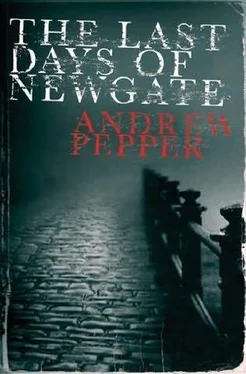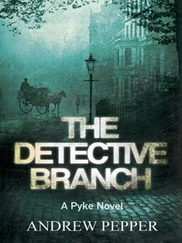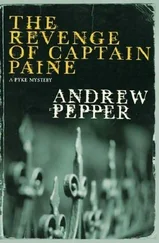Andrew Pepper - The Last Days of Newgate
Здесь есть возможность читать онлайн «Andrew Pepper - The Last Days of Newgate» весь текст электронной книги совершенно бесплатно (целиком полную версию без сокращений). В некоторых случаях можно слушать аудио, скачать через торрент в формате fb2 и присутствует краткое содержание. Жанр: Исторический детектив, на английском языке. Описание произведения, (предисловие) а так же отзывы посетителей доступны на портале библиотеки ЛибКат.
- Название:The Last Days of Newgate
- Автор:
- Жанр:
- Год:неизвестен
- ISBN:нет данных
- Рейтинг книги:4 / 5. Голосов: 1
-
Избранное:Добавить в избранное
- Отзывы:
-
Ваша оценка:
- 80
- 1
- 2
- 3
- 4
- 5
The Last Days of Newgate: краткое содержание, описание и аннотация
Предлагаем к чтению аннотацию, описание, краткое содержание или предисловие (зависит от того, что написал сам автор книги «The Last Days of Newgate»). Если вы не нашли необходимую информацию о книге — напишите в комментариях, мы постараемся отыскать её.
The Last Days of Newgate — читать онлайн бесплатно полную книгу (весь текст) целиком
Ниже представлен текст книги, разбитый по страницам. Система сохранения места последней прочитанной страницы, позволяет с удобством читать онлайн бесплатно книгу «The Last Days of Newgate», без необходимости каждый раз заново искать на чём Вы остановились. Поставьте закладку, и сможете в любой момент перейти на страницу, на которой закончили чтение.
Интервал:
Закладка:
Pyke found himself wondering how such sentiments would affect his investigation.
Finding the main entrance boarded up, he wandered around the side of the building, along a narrow passage leading into Great Scotland Yard, and tried the door that led into the old watch house.
Almost at once, he found himself confronted by the same surly man whom he had encountered at the lodging house. Pyke said that he wanted to see Charles Hume and was told, curtly, that he would have to wait a long time. The man explained there had been an important development in the St Giles murder investigation but he did not reveal what it was and Pyke did not ask.
Pyke asked to see the possessions of the deceased. At first, the man informed him that such a request was out of the question. It was only when Pyke threatened to solicit the help of the Home Office that the man relented and directed him, reluctantly, into a small room that looked out over the side alley. He pointed at a cupboard and told Pyke that what little they had removed from the room had been placed on the top shelf. The dust already gathered on top of the cupboard indicated that the Magennises’ possessions had not been regarded as important to Hume’s investigation.
He removed the few possessions from the cupboard and arranged them carefully on a wooden table. One at a time, he picked up both the Bibles and opened them. The first was a King James edition. It was marked and dated: Edinburgh, 1792. He idly flicked through it but found nothing of interest. The other was a Douay Bible. It was marked and dated: Dublin, 1803. The fact that they had owned two Bibles intrigued him, as did the different editions and, indeed, the different places of publication. Edinburgh and Dublin. King James and Douay. Pyke paused, to consider the name. Douay. Wasn’t that a place, too? He closed his eyes and racked his brain for an answer.
He heard Emily’s voice: People aren’t always who you imagine them to be. Who did he imagine Stephen and Clare to be?
What did he know about them? That they were poor, working folk from Ulster, Ireland. They were Protestants. .
Then it struck him: what had been bothering him all along. At first it was just the cousin’s name. Mary. The mother of Christ. The Virgin Mary. There were plenty of girls called Mary who had nothing to do with the Catholic faith but, then again, how likely was it that Protestant parents from Ulster would call their little girl Mary? Pyke did not know, of course, whether Mary’s parents were Protestants or not but the point was an intriguing one. What if Mary and indeed Clare were not, in fact, Protestant? What if Clare was Catholic and Stephen was Protestant? Douay, he now remembered, was a place in France. It was home to a Catholic monastery. One of them was Roman Catholic. That was what he had missed, what they had all missed.
Pyke sat at the table for a while and tried to consider how this new information altered the nature of his investigation. On its own, it did not explain or justify anything but it seemed to be a significant discovery, if only because of the ill-feeling that such a mixed attachment might have engendered in both families. Was that why they had fled Ulster in the first place? And had someone followed them to London and discovered that Clare was, in fact, expecting a baby? Was it possible that such news could have unbalanced a relation to such an extent that he had taken matters into his own hands? Did such hate exist, Pyke wondered, when directed at one’s own kin?
One thing was for certain, Pyke decided as he stared down at the two Bibles on the table. It meant that finding Mary Johnson was more crucial than ever.
Later, when Pyke was finally shown into Charles Hume’s office, the man did not want to hear about what he referred to as Pyke’s ‘fanciful notions’ about Catholics and Protestants. Rather, he glowed with self-satisfaction.
‘Listen, Pyke, I can tell you this much. We have now arrested someone and I’m almost certain he’s our man. I cannot tell you his name but he’s thirty years old, mentally ill, with a history of violence. He escaped from a nearby asylum two weeks ago. His sister lives in the street adjacent to the lodging house. We found a razor in his room and blood on his clothes. We’re questioning him at the moment. It’s only a matter of time before he cracks and when he does and we elicit a confession, that will be the end of it. The investigation will be closed.’
Pyke waited for a moment, allowing his anger at the man’s complacency to pass. ‘Tell me this, Hume, are you merely incompetent or is someone compelling you to arrive at a hasty and ill-judged conclusion?’
Hume put down his pen and stared at Pyke. ‘You dare to presume that I am corrupt?’
‘What motivation did this man have to kill these people? How do you explain that kind of hatred?’
‘You can’t apply rational logic to the deeds of the insane,’ Hume said, as though the issue were beyond discussion.
‘Except that this wasn’t the work of a madman. A man blinded by hate, perhaps. .’
‘This city is about to tear itself apart and you’re proposing that we further stoke the flames by making it public we’re looking for some kind of religious bigot?’
‘I’m not proposing to make anything public,’ Pyke said. ‘I just don’t want to see a man go to the gallows simply to expedite the government’s political ambitions.’
That pushed Hume too far. He was a military man and didn’t understand the subtleties of political brinkmanship. He rounded his desk and stepped towards Pyke, as though preparing to strike him.
‘Take that remark back, sir.’ Hume’s neck was corded with veins.
‘When your man hangs and your puppet-masters pat you on the back, remember this conversation and think about how you feel.’
‘If and when he hangs, it will be because a court of law and a jury of his peers have found him guilty.’
Pyke made to leave. ‘Tell that to yourself when you are lying awake at night,’ he said, hesitating at the door without turning around to face Hume.
Behind him, Hume was now shouting: ‘This investigation is closed. Go back to Bow Street while you still have a position.’
EIGHT
The springs of the carriage groaned as the figure inside edged towards the window. The footman, an unsmiling man Pyke did not recognise, stood beside the carriage but made no attempt to pull down the steps, or open the door, either to permit the passenger to disembark or to invite Pyke into the carriage’s interior. Nonetheless, it was clear from the manner in which the vehicle was parked outside the gin palace, and from the general demeanour of the footman, that Pyke’s attention was being solicited. It was a windy night, and the visibility, impaired by swirling fog, was improved only slightly by a gas lamp that hissed noisily at one end of the narrow street. The unusual sight of a gentleman’s carriage in the vicinity of Bartholomew’s Field had already attracted the attentions of a gang of children who were prodding the unsettled horses, compelling the footman to round the vehicle and chase them away with an umbrella. Pyke took this opportunity to step forward and peer into the gloom of the carriage’s interior. Edmonton’s chalky face, slick with perspiration, stared back at him, like an apparition.
‘It’s always revealing and indeed gratifying to see creatures in their natural habitats,’ Edmonton said, glancing contemptuously at the entrance to the gin palace. ‘I thought the other day, when you visited Hambledon, that there is nothing more unpalatable than seeing vermin feast at the table of a gentleman.’
Pyke looked into the old man’s arid eyes. ‘Your servants seem to manage well enough.’
This drew a flinty smile. ‘Part of me wants to admire you, for your spirit, pathetic and misguided as it is.’
Читать дальшеИнтервал:
Закладка:
Похожие книги на «The Last Days of Newgate»
Представляем Вашему вниманию похожие книги на «The Last Days of Newgate» списком для выбора. Мы отобрали схожую по названию и смыслу литературу в надежде предоставить читателям больше вариантов отыскать новые, интересные, ещё непрочитанные произведения.
Обсуждение, отзывы о книге «The Last Days of Newgate» и просто собственные мнения читателей. Оставьте ваши комментарии, напишите, что Вы думаете о произведении, его смысле или главных героях. Укажите что конкретно понравилось, а что нет, и почему Вы так считаете.












